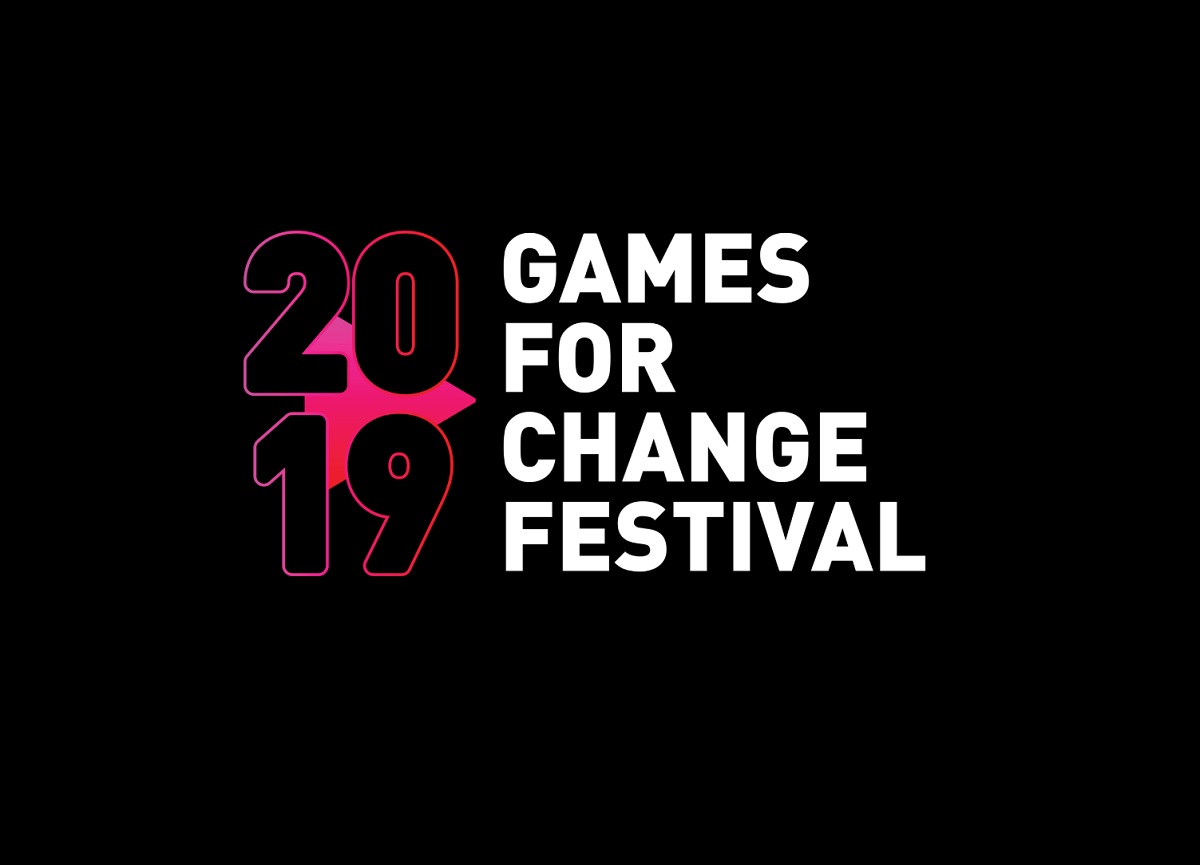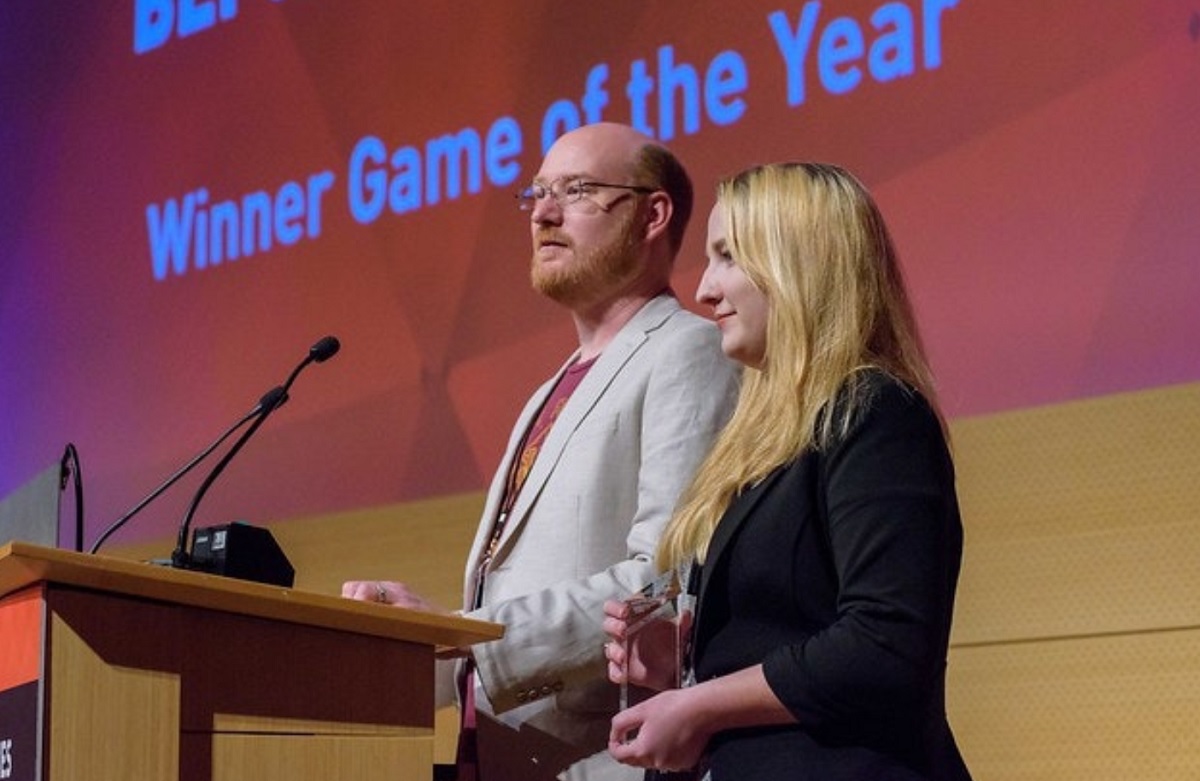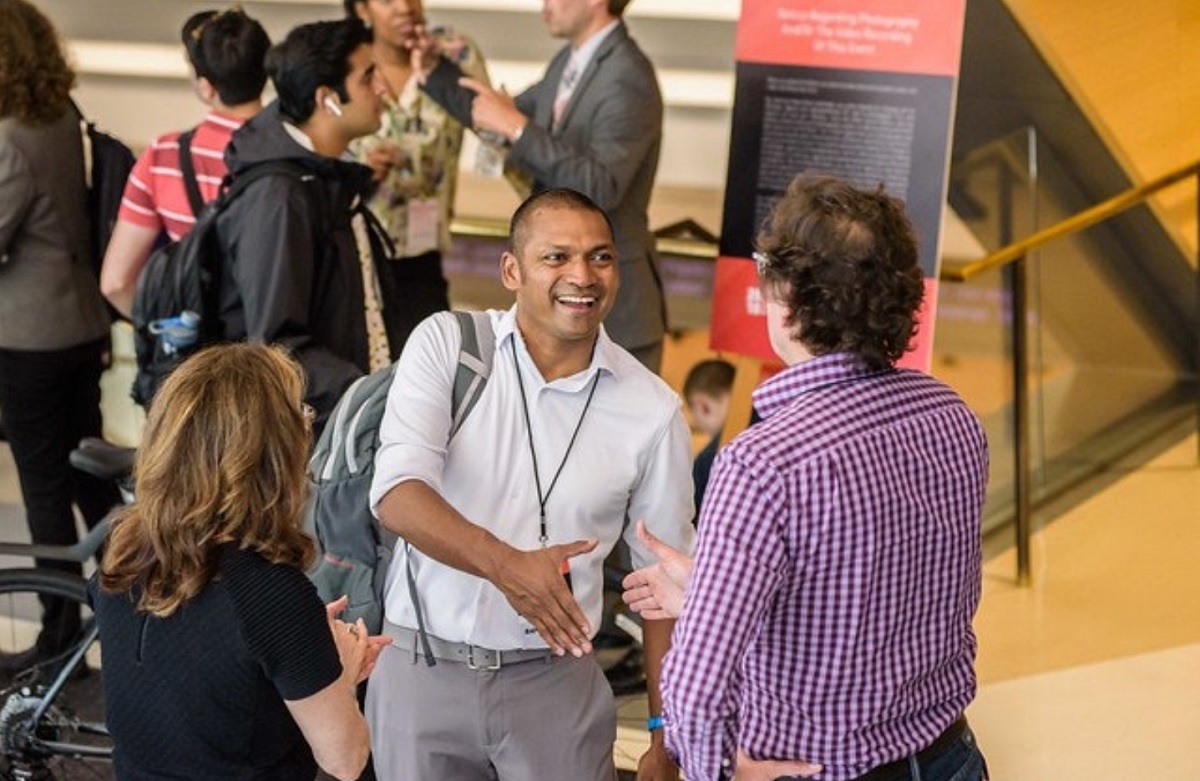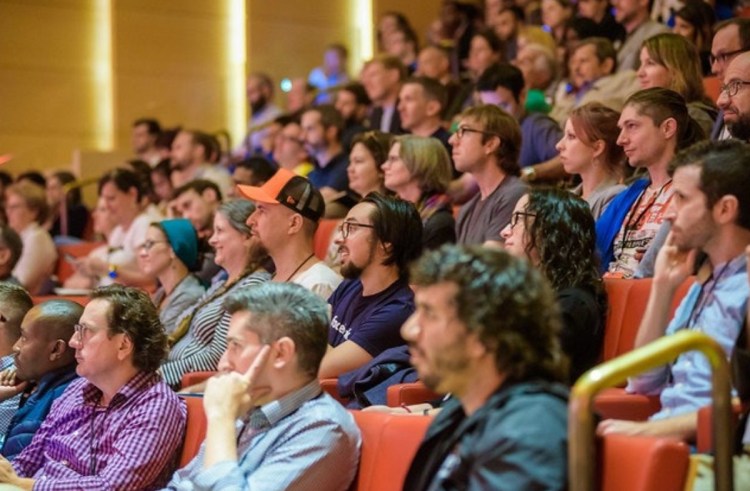The 16th annual Games for Change Festival gets underway on Monday, and the main event focuses on the social and educational impact of games on modern society.
The 15-year-old show draws more than 1,200 people a year to New York for panels and demos about the merging of games and other topics such as neuroscience, wellness, social issues, and learning.
Games for Change started in 2004, and this year it will feature leading voices for change such as Michael Strautmanis (Obama Foundation), Leo Olebe (Facebook), Anantha Duraiappah (UNESCO MGIEP), Stan Pierre-Louis (Entertainment Software Association), Cindy Ball (Oculus), Brent Bushnell (Two Bit Circus), Robin Hunicke (Funomena), and Jessica Brillhart (Vrai Pictures).
The event will also feature the third annual XR for Change Summit on June 17, which will be preceded by the two-and-a-half day XR Brain Jam. The festival will feature talks on civics and social issues, games for learning, and health.
June 5th: The AI Audit in NYC
Join us next week in NYC to engage with top executive leaders, delving into strategies for auditing AI models to ensure fairness, optimal performance, and ethical compliance across diverse organizations. Secure your attendance for this exclusive invite-only event.
The festival also features an awards show with honors for categories like Best College Game and Best XR Experience. I talked with Games for Change president Susanna Pollack about the festival. This year, much of the talk will be about making the game industry more diverse, accessible, and meaningful.
Here’s an edited transcript of our interview.

Above: Susanna Pollack is president of Games for Change.
GamesBeat: What are the highlights of this year’s festival, and how has it changed over time?
Susanna Pollack: There are a few big themes that are happening around Games for Change Festival and the work we’re doing. This is the 16th year of running the event. Last year was our 15th anniversary, where we were recognized by the mayor’s office in New York for developing and supporting a community of practice, developing the games industry. Now we’re looking at what’s next for Games for Change.
Part of that is the community we’re building around XR and embracing and supporting creators, researchers, and developers who are using games as a driver of impact in the health care sector and the education sector. Also, we’re looking at ways in which we can help advance this sector into an industry. That leads to the Games for Change accelerator that we launched at GDC. We’re now in the process of selecting our first cohort. That will have a presence at the festival.
It speaks to where we see the trends going, the opportunities that XR and games are being given now within the B-to-B sector. It’s years of research and advocacy delivering the data that’s needed to demonstrate that these media, these technologies can have impact. It’s an exciting place to be. We’re looking to highlight a lot of those kinds of projects at the festival. I don’t know if you’ve tracked it, but we did break out XR for Change as a separate day from the rest of the Games for Change festival, so we can tell those stories in a hyper-focused way.
Before the XR for Change day, we’re having a Brain Jam. It’s the third year we’re running a game jam of sorts, what we call the Brain Jam. We bring together VR developers and researchers in neuroscience to explore how the different domains, how VR can support the work that researchers are doing in the field. We’re hoping to help facilitate collaboration between different domains, different expertise areas, and that can foster into early project-based developments that one day might be able to join the accelerator further along the pipeline. We run that with Carnegie Mellon University’s ETC program. It sets the tone for what XR for Change will be about on the next day.
What excites me there is that we have speakers that are talking about how VR is being used with incarcerated individuals and their pathway to being released from prison, something on a very human level, a human and training level. We have a chief scientist from Striver talking about the science behind those programs, supporting training. We’re also exploring how VR is being used in education. The work being done at the Joan Ganz Cooney Center, the research arm of Sesame, they’re doing a lot of work around VR and childhood. There’s an interesting dialogue going on around the ethics of building VR for young people when their brains are still forming, how to create standards.

Above: Games for Change Festival 2019
GamesBeat: I went to HTC’s demo day at the Vive X accelerator recently. They had a company there called Mind VR. They were doing VR as re-creation and therapy for older people in senior living communities.
Pollack: Yeah, totally. We’re having AARP present on just that. AARP has a lab called the Hatchery. They’ve been investing in developing platforms to serve their communities. There’s a platform called Alcove VR, which is collecting VR experiences for that purpose, helping seniors deal with isolation when they’re no longer mobile, and other physical well-being issues. There’s a session on aging better using games and VR. I don’t think we have Mind VR there, but we do have Embodied Labs participating. They’re helping health care providers envision what it would be like to have degenerative eye diseases, to help train people to understand what it’s like to live in a world where sight is limited.
We’re absolutely serving new demographics, whether it’s preschool or the aging community. VR plays a role in all of that. We’ll have Robin Hunicke there, and to me that’s great, because she represents amazing game designers who are now looking at VR as a platform for storytelling with impact. She’s going to be showing Luna.
Magic Leap will be there too. We have some nice representation on the hardware side about their For Good programs. HTC will be there talking about their HTC For Impact. Cindy Ball will be talking about Oculus and education. All of them will be showing, within our Immersive Arcade, 20 or so experiences, all impact-oriented.
GamesBeat: Will the Xbox adaptive controller folks be there?
Pollack: They were there last year. We highlighted their announcement and they came and presented. I don’t think they’ll have a presence this year, but we are having others on the Games for Change side of the festival talking about the able community. Someone from Able Gamers is speaking. There are at least two or three talks about accessibility, but I don’t think the adaptive controller will be there.
GamesBeat: It seems like there’s a lot of progress on a lot of fronts here, though.
Pollack: What’s nice to see, ever since I joined the organization — I don’t think it’s all me. It’s the maturity of the sector. But there’s a lot more industry participation and interest in what we’re doing. Pokemon is going to be there to present. Ubisoft is receiving their first industry leadership award, which we designed to acknowledge the major players at triple-A studios and those who are endemic to the sector that are demonstrating what we feel are the values of games for impact, whether it’s in product development or CSR initiatives.
Ubisoft’s contribution — what made us realize that it was time to do this was their quick response to what happened at Notre Dame in France, with their donations and making their games available for free. They’ve been working in the education sector for the past several years, developing the Assassin’s Creed Discovery Tour. They helped develop one of the two games submitted to the FDA for approval with Amblyotech, to treat lazy eye. They’re coming to talk and receive an award, and I’m encouraged that there’s more interest from that sector in participating.

Above: Games for Change Festival 2019
GamesBeat: I don’t know if you have an observation about this. It seems like there’s a lot of progress on the front of acceptance of diversity and accessibility across the industry. But there are still these pockets of gamers who aren’t so tolerant. I’ve run into them this past week with my views about Call of Duty and the latest game, which is so much more graphically realistic in its depiction of violence. They weren’t fond of my suggestion that they should drop these scenes from the game. I wonder how you feel about — what is that core group’s view and tolerance of this effort toward accessibility that’s happening.
Pollack: Well, I don’t know if I can really comment on that. As Games for Change, we’re not in dialogue with them directly. Our approach to building community and advocacy goes from core believers outward, trying to spread our point of view, as opposed to going in deep with communities and trying to convert people and change perspectives. I do think that’s important, and it’s something that we’re hoping we’ll be able to play a role with in the next year and a half, changing the narrative around games. But I don’t feel that we’ve had as active a role in doing that as part of our strategy.
That said, on a personal level, I think that change is always going to be slow. There’s always going to be a minority, a highly vocal minority, even if the minority is larger than you’d hope it would be. With the way social media and the internet are structured today, those people are always going to be vocal. They’re going to have a platform. It’s about creating enough tolerance around them in a way such that they’re shamed into silence. There’s an overwhelming swell of those people who are tolerant and are embracing that such that it becomes a larger voice than the few who make a lot of noise. That’s the way of social change.
GamesBeat: Maybe a more interesting question is how you reach people with a message about accessibility.
Pollack: It’s cultural. I actually don’t think it’s solely a gaming issue. This idea of accessibility and inclusivity in our culture is something that is being done on so many levels, whether it’s LGBTQ communities, the trans community, or the accessibility issue and that community. It’s about, broadly speaking, as humans on this planet we all deserve to be treated with respect. Within the gaming sector, there are tools being developed and systems being adapted that allow for these experiences to be accessible to everyone.
As I said, I think it’s not unique to the games industry. It’s what you’re covering and what I’m working in, but we’re seeing those changes happening across industries, as we realize that everyone deserves to have the same chance, the same access.
GamesBeat: I looked at the finalists you have, and there’s a lot of very good games in all of these categories. Do you have any observations about the kind of games that are up for awards this year?
Pollack: These are observations, because as a rule Games for Change, while we organize the awards process, we don’t take any specific role in making the decisions. That’s all done by peer review. What I can say, though, is that what I see, and am really pleased by, is the range of types of games and experiences, and who’s making them, whether they’re the indie working with a very small team and making huge impact, or larger companies like Nintendo Labo, which is so unique in what you’re doing and what you experience. Discovery Tour was nominated and made it to the finals.

Above: Games for Change Festival 2019
I also think there’s a great theme around speaking to personal experiences and talking about inclusivity. The personal stories, the experiences around showing a personal expression that leads to empathy and tolerance and different perspectives on society — there are some beautiful stories about humanity being expressed in these narrative-driven games. That, to me, is elevating the art form of what games for impact can be.
I’m encouraged by the quality of our student games. This is our first year of running a higher education category, and the quality of the games could easily compete across all of the different categories. We did require those students to self-identify if they wanted to participate in the student game category. Those are some incredible projects coming though.
On the XR side, this is the first year we’ve separated out XR for change experiences, and we do see some crossover, which is really exciting. Schell Games’s HoloLAB was nominated for best learning game in a game category, as opposed to an XR category.
GamesBeat: Some of these games saw pretty good commercial success, like Detroit and Discovery Tour, and Florence as well.
Pollack: Impact games have traditionally been seen as a very niche genre, and very hard to break through. We’re able to see now that games can be entertaining, fun, and commercial successes, as well as having some kind of underlying value as far as contributing to social good. It may be explicit, like Discovery Tour, which was developed to be used as an educational product, or something like Florence or Detroit, which is more of an artistic expression, but is designed in such a personal and authentic way with a point of view that it can fall into the games for impact category.
GamesBeat: Are there any other topics you wanted to hit today? I know there’s a lot going on for you.
Pollack: [laughs] That’s one of the unique things about the festival, that we are so broad. We’re trying to acknowledge and support the amazing progress that this medium is having in different sectors. There’s a lot to talk about.
I would like to talk about the accelerator, though. It’ll have a place at the festival as we try to provide our community with access and insights into where funding opportunities are. That’s one of the pain points for people working in the games for change and XR for change sectors: how to get a project funded if it’s not self-funded or part of a bigger, more successful studio. Are there government grants available to them through the SBIR program? What are Oculus and HTC doing as far as creative grants? What about the investment community?
Through the Games for Change accelerator, we hope to be able to provide financial resources to deserving teams that we think have fantastic potential to become commercial successes and drive measurable impact. We also want to open the door to resources for these teams that might otherwise have a hard time getting access to. Whether it’s assessment experts or distribution partners or user acquisition partners or legal and marketing, we can bridge the gap for those teams that have developed amazing products, or are on their way to developing them, but have struggled to find effective go-to-market strategies.
GamesBeat: Do you have any thoughts on E3? Is there anything happening there for you?
Pollack: I have to admit, I’m not going to E3. The only reason I’m not going is our conferences are too close. I love E3, and I should be there. But it’ll be interesting to see, again, the balance of professionals versus the public experience. I experienced it over the last few years, and there are some great things about it. As an industry professional, there are some frustrating things about it. But I do think it’s important that we, as an industry, do acknowledge and bring consumers into the conversation, because they’re ultimately driving our success.
GamesBeat: How many people do you expect at the festival this year?
Pollack: We’re growing. We reached 1,100 people last year, and we’re expecting to top that.


